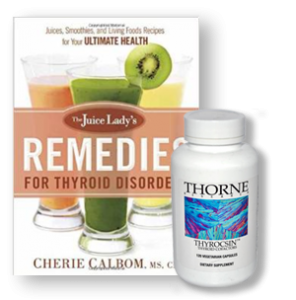Thyroid and Osteopenia/Osteoporosis
Thyroid and Osteopenia/Osteoporosis
Osteoporosis, osteopenia, or bone loss can be caused by thyroid levels (T3 and T4) that are too high or too low. High thyroid levels up-regulate the genes involved with bone resorption or bone loss. But thyroid hormone also up-regulates the genes involved with bone formation and bone generation. If thyroid levels are too low, bone generation is impaired. Healthy bone metabolism requires thyroid levels that are neither too high nor low.
Research has shown that thyroid stimulating hormone (TSH) has a dual function: Osteoblasts actually have TSH receptors that are constantly “listening” for signals from TSH. T3 sets the bone building tempo. It needs to be consistent and regular to produce harmonic results, and it involves many key players. For instance, osteoblasts actually play an important role in mediating the thyroid hormone stimulation of osteoclastic resorption, according to a study published in the European Journal of Endocrinology. This means that osteoblasts act as mediators between thyroid hormone and osteoclasts (the cells that tear down bone).
Without sufficient T3, normal bone remodeling is disrupted, and bone resorption happens at a more rapid rate than bone building. The result is decreased bone density and osteopenia or osteoporosis.
Other Related Conditions Associated with Thyroid Disorder
- Adrenal Fatigue (see The Juice Lady’s Remedies for Stress and Adrenal Fatigue)
- Anemia
- Hyponatremia (low blood sodium)
- Lack of coordination
- Clumsiness
- Tendency to fall
- Dizziness
- Fainting episodes
- Vertigo
- Tremor
- Growth disturbances in children
- Chronic allergies
- Chemical sensitivities
- Restless Leg Syndrome
- Rhabdomyolysis (destruction of skeletal muscle)
- Scoliosis
- Hernia
For the sake of your bones, it is very important to feed your thyroid and support the health of this gland. Nutrients that empower the thyroid are very important to include when you are under stress as well as when you have symptoms of low thyroid. (Take the Thyroid Quiz) Iodine is necessary for formation of T4, while L-tyrosine is a necessary component of both T4 and T3 formation. Animal studies indicate the botanical ashwagandha can increase T4 concentrations. Several nutrients are also necessary for conversion of T4 to T3, including the minerals selenium, zinc, and copper. An insufficiency of vitamin B 12 appears to interfere with the activity of thyroid hormones. Conversion of T4 to T3 can be inhibited by heavy metal toxicity and lipid peroxidation; the antioxidant vitamins C and E can counterbalance this inhibition.
For more information and remedies for thyroid health, get my book The Juice Lady’s Remedies for Thyroid Disorder.
On special now for just $9.00.
Thyrocsin™
(contains all the nutrients noted above) $27.35
Today’s special offer Thyroid Book + Supplement Special offer Thyroid Renew-
the book and the supplement – $35.95
Read More











